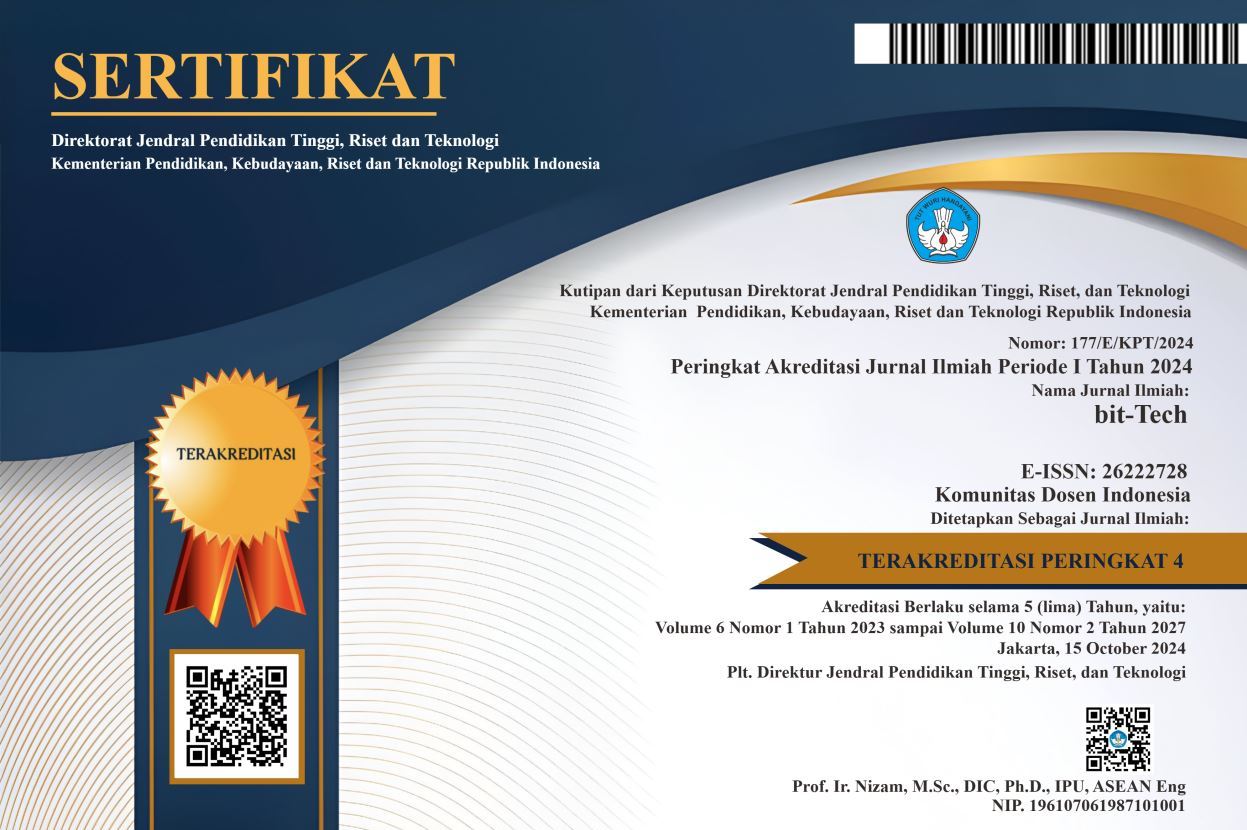Design of Health Monitoring System Based on Internet of Things (IoT): ESP8266 and BLYNK
DOI:
https://doi.org/10.32877/bt.v6i2.1036
Keywords:
Health Monitoring, Internet of Things (IoT), ESP8266, BLYNK, Max30102 Sensors
Abstract
Health monitoring is important for living creatures. There are many things that are important factors in the health of living creatures, especially humans, including heart rate, body temperature and oxygen saturation. IoT technology is very helpful in the development of health technology so that it becomes possible to monitor patient health in real time and patient emergency information can be accessed easily. This research also aims to design an Android-based heart rate monitoring system using ESP8266 as a microcontroller. The sensor used is Max30102. The research method used is applied research, with experimental research methods. The research stages carried out were literature study, software design, hardware design, system testing, and analysis. The results of the research are the design of a patient health monitoring tool with three measured indicators, namely the patient's heart rate, body temperature and oxygen levels. The system can monitor in real time based on Internet of Things and can be accessed by Android and iOS. From the study results, it was found that the Android-based health monitoring system has an accuracy rate of 97.63% and it can be said that the system can be used for patient measurements. With details, 96.71% is the accuracy level for measuring heart rate, 96.45% accuracy level for measuring oxygen levels in the patient's body, and 99.75% accuracy level for measuring patient temperature.
Downloads
References
D. G. H. W. T. S. S. Musyahadah Arum Pertiwi, "Measurement of Heart Rate and Body Temperature Based on Android Platform," IJEEMI, vol. 2, no. 1, pp. 26-33, 2020.
H. R. Fajrin, M. R. Ilahi, B. S. Handoko and I. P. sari, "Body temperature monitoring based on telemedicine," in The 1st International Conference on Engineering and Applied Science, Konya- Turki, 2019.
S. S. E. P. Yudha, M. W. Kasrani and A. F. S. Rahman, "Pembuatan Prototipe Sistem Pemantauan Gejala Aritmia dan Hipoksemia Berbasis IoT," JTE UNIBA, vol. 7, no. 1, pp. 284-289, 2022.
J. Dian, P. D. S and N. D. S, "SISTEM MONITORING DETAK JANTUNG UNTUK MENDETEKSI TINGKAT KESEHATAN JANTUNG BERBASIS INTERNET OF THINGS MENGGUNAKAN ANDROID," JURNAL JUPITER, vol. 13, no. 2, pp. 69-75, 2021.
H. R. Fajrin, B. S. Adi, H. Purwoko and I. P. Sari, "Telemedicine-equipped android interface-based heart rate monitoring," Indonesian Journal of Electrical Engineering and Computer Science, vol. 21, no. 3, pp. 1332-1340, 2021.
M. G. A. A. M. H. A. A. Radwa Sameh, "Design and implementation of an SPO2 based sensor for heart monitoring using an android application," in ICaTAS 2019, Cairo, 2019.
M. A. Adrian, M. R. Widiarto and R. S. Kusumadiarti, "Health Monitoring System Dengan Indikator Suhu Tubuh, Detak Jantung Dan Saturasi Oksigen Berbasis Internet of Things (IoT)," Jurnal PETIK, vol. 7, no. 2, pp. 108-118, 2021.
Muthmainnah, D. B. T and I. Tazi, "Karakterisasi Sensor MAX30102 Sebagai Alat Ukur Detak Jantung dan Suhu Tubuh Berbasis Photoplethysmograph," Jurnal Pendidikan MIPA, vol. 12, no. 3, pp. 726-731, 2022.
Muthmainnah and D. B. T, "Prototipe Alat Ukur Detak Jantung Menggunakan Sensor MAX30102 Berbasis Internet of Things (IoT) ESP8266 dan Blynk," JISKA (Jurnal Informatika Sunan Kalijaga), vol. 7, no. 3, pp. 163-176, 2022.
H. B. D. D. Simi S, "DESIGN AND DEVELOPMENT OF INTERNET ENABLED HEART RATE MONITORING SYSTEM," INTERNATIONAL JOURNAL OF INNOVATIONS IN ENGINEERING RESEARCH AND TECHNOLOGY [IJIERT], vol. 5, no. 5, pp. 96-102, 2018.
B. G. I. T. P.-H. H. Dyah Purwitosari, "Design and Development of SpO2, Bpm, and Body Temperature for Monitoring Patient Conditions in IOT-Based Special Isolation Rooms," Jurnal Teknokes , vol. 16, no. 2, pp. 94-102, 2023.
W. F. B. A. A. Akhmad Solikin, "Design of Measuring and Monitoring Device based on Microcontroller and Android," Journal of Applied Electrical & Science Technology – University of PGRI Adi Buana Surabaya, vol. 5, no. 1, pp. 21-24, 2023.
R. W. H. S. d. MS Iswahyudi, BUKU AJAR METODOLOGI PENELITIAN, Jambi: PT. Sonpedia Publishing Indonesia, 2023.
M. I. H. Rindi Wulandari, "DESIGN PROTOTYPE OF SMART DETECTOR ENVIRONMENT SYSTEM ON SEMICONDUCTOR DETECTOR STORAGE (HPGE)," Journal of Green Science and Technology, vol. 6, no. 2, pp. 65-72, 2022.
R. Wulandari, "Rancang Bangun Pengukur Suhu Tubuh Berbasis Arduino Sebagai Alat Deteksi Awal Covid-19," in Prosiding SNFA (Seminar Nasional Fisika dan Aplikasinya) 2020, Semarang, 2020.
R. D. W. Lukman Aditya, "RANCANG BANGUN ALAT PENGUKUR KADAR OKSIGEN NON INVASIVE MENGGUNAKAN SENSOR MAX30100," Jurnal Ilmiah Elektrokrisna, vol. 8, no. 2, pp. 62-69, 2020.
Downloads
Published
How to Cite
Issue
Section
License
Copyright (c) 2023 bit-Tech : Binary Digital - Technology

This work is licensed under a Creative Commons Attribution-ShareAlike 4.0 International License.
I hereby assign and transfer to bit-Tech all exclusive copyright ownership rights to the above work. This includes, but is not limited to, the right to publish, republish, downgrade, distribute, transmit, sell, or use the work and other related materials worldwide, in whole, or in part, in all languages, in electronic, printed, or any other form of media, now known or hereafter developed and reserves the right to permit or license a third party to do any of the above. I understand that this exclusive right will belong to bit-Tech from the date the article is accepted for publication. I also understand that bit-Tech, as the copyright owner, has sole authority to license and permit reproduction of the article. I understand that, except for copyright, any other proprietary rights associated with the work (e.g. patents or other rights to any process or procedure) must be retained by the author. In addition, I understand that bit-Tech permits authors to use their papers in any way permitted by the applied Creative Commons license.


 DOI :
DOI :
 Abstract views: 557
/
Abstract views: 557
/  PDF downloads: 264
PDF downloads: 264











